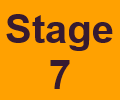Phonological awareness stages 1 - 7
Phonological awareness relates to our sensitivity and understanding of the sound structures of our oral language. It enables us to progress from our awareness of large sound units (words in sentences) to smaller sound units (phonemes in words). It also incorporates the ways in which we communicate through speech, body language and written forms.
Research suggests that our phonological awareness begins in the womb. New born babies have a preference for their mother’s voice, as they have had an extended period of time hearing the voice before they are born, and so find it comforting. They do not understand the words, just the sound rhythm and intonation of her speech pattern; more like music.
The pre-phonics stages below are listed in a developmental order from one to seven. Against each stage we have provided an age range guide based on research, which shows when most children develop the various phonological awareness skills.


Stage 1 - (Unborn - 1 year)
Your child will learn to recognise, differentiate and respond to both speech and non-speech sounds, start to recognise words and interpret facial expressions and body gestures. They will begin making sounds, mimic speech patterns and start to use body language to express their needs, wants and thoughts.

Stage 2 - (1 year - 2+ years)
Your child will start to isolate individual words in a speech flow, engage in sound play and recognise that sentences are made up of individual words.

Stage 3 - (2 years - 4 years)
Your child’s awareness of rhyme will emerge, with them enjoying nursery rhymes, songs and stories with rhyme alliteration and repetition.

Stage 4 - (3 years - 5 years)
Your child starts to develop an understanding that words can be split into parts (syllables) and that these parts give the word its rhythm. They should be able to orally blend syllables together to form words and segment words into syllables.

Stage 5 - (4 years - 5 years)
Your child will be able to group words by sound, not spelling, such as chair, bear, stare etc. They will begin to understand that syllables in a word can be further broken down (segmented) into smaller sound units referred to as onset and rime.

Stage 6 (Phonemic awareness) - (4 years - 6 years)
Your child will be able to orally identify the initial and final sounds in words and the medial sound in mono-syllabic words. They will be able to split words into their individual sounds and blend sounds to make words. This is purely verbal and based on what your child hears and not the written representation of the word.

